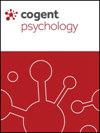大学生紧急在线学习中抄袭意图的社会认知决定因素:将情绪、动机和道德因素整合到计划行为理论中
IF 1.6
Q2 PSYCHOLOGY, MULTIDISCIPLINARY
引用次数: 0
摘要
本文章由计算机程序翻译,如有差异,请以英文原文为准。
Socio-cognitive determinants of plagiarism intentions among university students during emergency online learning: Integrating emotional, motivational, and moral factors into theory of planned behavior
Abstract The exceptional circumstances surrounding the COVID-19 closures of campuses and emergency online learning have caused challenging circumstances on preserving academic integrity. Still, little is known about how the interplay between diverse contextual and psychological determinants influences beliefs and inclinations to plagiarism during online learning. The current study aims to understand better multiple factors that predict attitudes and intentions to commit plagiarism during and after the pandemic. To that end, an extended model based on the theory of planned behavior (TPB) that examines the impact of socio-psychological, emotional, motivational, and ethical factors explaining plagiarism intentions was tested. The study applied a survey instrument to a sample of 435 undergraduate students from three universities in Oman. Using the Partial Least Squares-Structural Equation Modeling (PLS-SEM), the results showed that fear of COVID-19 significantly and positively impacted the plagiarism attitude. Academic self-efficacy significantly and negatively influenced attitudes to plagiarism. All TPB variables significantly influenced intention to plagiarize, including subjective norms, attitudes perceived behavioral control and past behavior, except moral obligation. The current study’s findings contributed to theory advancement by extending TPB to examining antecedents to subjective norms toward plagiarism and emotional and motivational determinants of attitudes. Finally, the current study recommends practical and research implications for curbing digital plagiarism in higher education post to the pandemic.
求助全文
通过发布文献求助,成功后即可免费获取论文全文。
去求助
来源期刊

Cogent Psychology
PSYCHOLOGY, MULTIDISCIPLINARY-
CiteScore
2.90
自引率
0.00%
发文量
75
审稿时长
12 weeks
期刊介绍:
One of the largest multidisciplinary open access journals serving the psychology community, Cogent Psychology provides a home for scientifically sound peer-reviewed research. Part of Taylor & Francis / Routledge, the journal provides authors with fast peer review and publication and, through open access publishing, endeavours to help authors share their knowledge with the world. Cogent Psychology particularly encourages interdisciplinary studies and also accepts replication studies and negative results. Cogent Psychology covers a broad range of topics and welcomes submissions in all areas of psychology, ranging from social psychology to neuroscience, and everything in between. Led by Editor-in-Chief Professor Peter Walla of Webster Private University, Austria, and supported by an expert editorial team from institutions across the globe, Cogent Psychology provides our authors with comprehensive and quality peer review. Rather than accepting manuscripts based on their level of importance or impact, editors assess manuscripts objectively, accepting valid, scientific research with sound rigorous methodology. Article-level metrics let the research speak for itself.
 求助内容:
求助内容: 应助结果提醒方式:
应助结果提醒方式:


